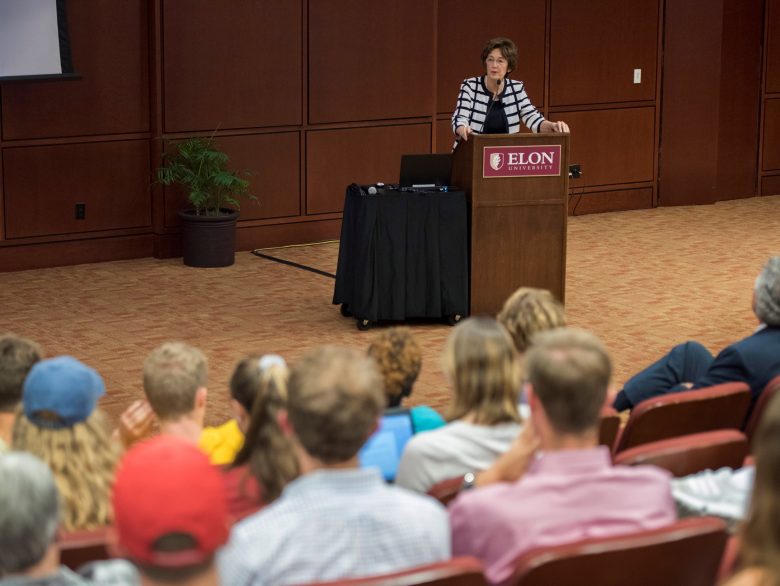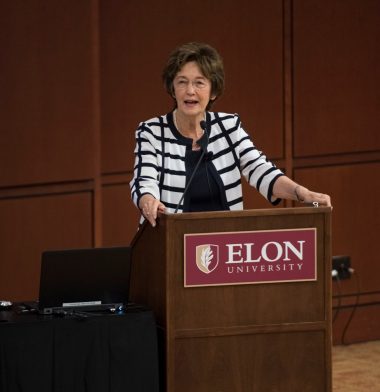Marshall, who in 1996 became the first woman to be elected to a statewide office in North Carolina, said the state needs to make bold moves and wise investments.

Marshall detailed strategies for solving the “Rubik’s Cube” of economic development by carefully aligning North Carolina’s cultural and economic strengths over time, as well as taking bold steps designed to cut the “Gordian knot” representing the state’s economic challenges. Marshall visited Elon and delivered remarks to Elon students and professors at the invitation of Robert Azar, adjunct instructor in management in the Martha and Spencer Love School of Business.
“Both of these puzzles can be busted,” said Marshall, who in 1996 became the first woman to be elected to a statewide executive post in North Carolina. “With the Rubik’s Cube, you need to need to approach it logically. You need to solve it gradually over time. With the Gordian knot, a solution requires a dramatic, bold action, slicing through the puzzle in one bold move.”
 As secretary of state, Marshall is charged with overseeing business registration, including the incorporation of new businesses. Other duties for her office include being a point of contact for international visitors, trademark enforcement, the regulation of investment advising, overseeing charitable solicitations and recording financial loans and liens.
As secretary of state, Marshall is charged with overseeing business registration, including the incorporation of new businesses. Other duties for her office include being a point of contact for international visitors, trademark enforcement, the regulation of investment advising, overseeing charitable solicitations and recording financial loans and liens.
At times, North Carolina has accomplished much with both approaches, the long-term strategy and the swift, decisive action. At other times, it’s failed to follow through either. North Carolina is “a place of edgy innovators,” but often is still thought of as a largely agricultural economy that still relies on the traditional industries of tobacco, textiles and furniture.
Today, North Carolina is more economically diverse and has invested heavily in developing its advanced manufacturing, biotech, energy and financial services sectors. “Manufacturing plants that produce advanced medicine and health care products have replaced tobacco across our landscape,” Marshall said.
That’s been possible because of investments in higher education — both the public university system as well as the network of community colleges, which is a key incentive for companies looking to invest in the state. However, the state’s K-12 education system lags behind those in many other states competing for economic development projects, and North Carolina, once known as the “good roads state,” has seen its transportation infrastructure crumble.
Recalling her time in the N.C. Senate prior to being elected to her current post, Marshall said North Carolina lost auto manufacturing plants to South Carolina and Alabama in the early 1990s because it wasn’t willing to offer competitive incentives packages to help sweeten the deal. Now, as a major automaker, rumored to be Toyota, looks to build a major U.S. plant, North Carolina is among the top three contenders, Marshall said, adding that she hopes the state is able to put together an attractive incentives package to build upon its other assets.
She argued for North Carolina to become more of a player on the venture capital scene, and said the state should continue to make international relations a key focus as it continues to build relations with foreign companies looking to invest in the U.S.
“We continue to try to push the boundaries and to compete at the highest levels,” Marshall said. “Personally, I think our potential for growth is even greater than what we’ve seen before.”


